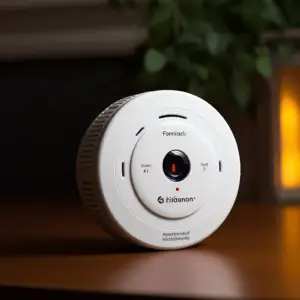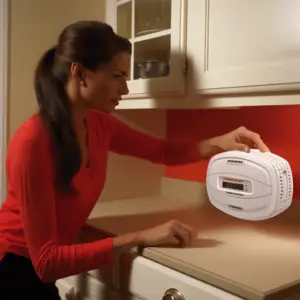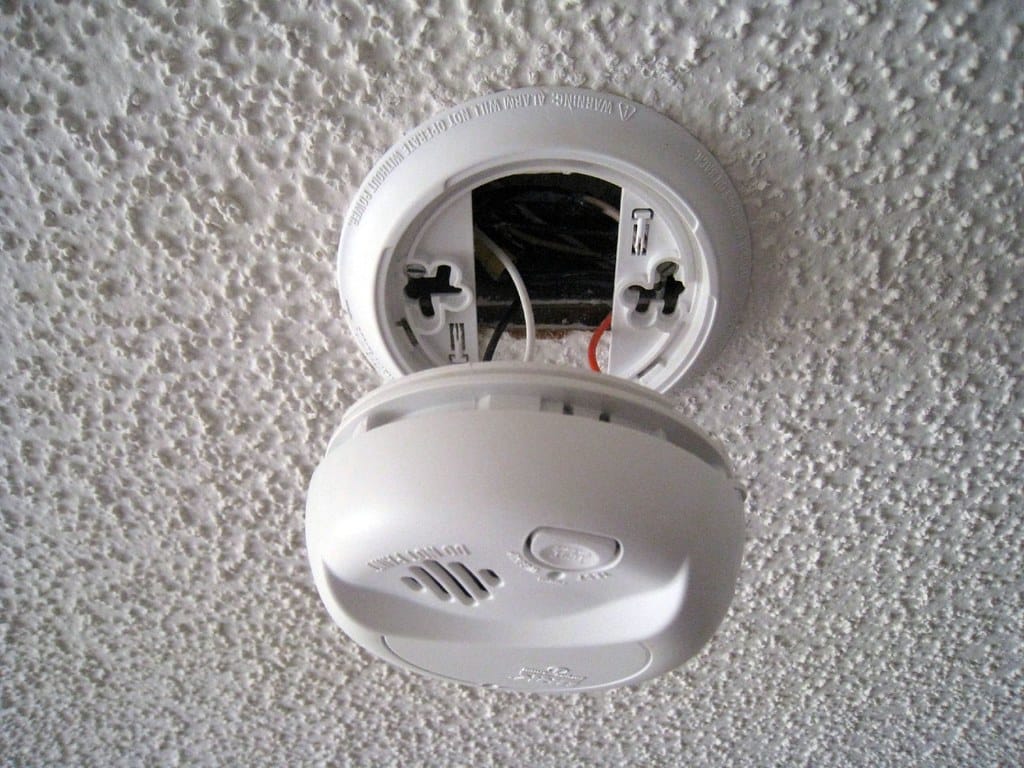Carbon Monoxide Alarms, When you hear the beeping sound of a carbon monoxide detector in the middle of the night, it’s natural to panic. But if you’re prepared, you can stay safe.
This is a horrible sound to hear in the middle of the night, especially when you know there is no CO present in your home. What should you do?
The first thing to do is check the battery on your carbon monoxide detector. Chances are good that your detector just needs to be reset or replaced. If you find that your battery is dead, replace it with a new one immediately! Carbon Monoxide Alarms find any signs of corrosion or damage on your carbon monoxide detector, then we’ll move on to other possible issues that could be causing this problem. This article will discuss cases and incidents where carbon monoxide detectors have gone off at night, why it happened and what to do about it.
Table of Contents
What Causes Carbon Monoxide Detector To Go Off in Middle of Night

Carbon monoxide (CO) is a byproduct of combustion — think car engines or fireplace flames — and is often found in homes with faulty furnaces, gas space heaters, or water heaters.
CO can be especially dangerous for people who suffer from heart disease or lung problems like asthma because carbon monoxide can make it hard for them to breathe properly.
Carbon monoxide poisoning symptoms include headaches, fatigue, nausea, and confusion.
The Consumer Product Safety Commission (CPSC) recommends that every home have a working carbon monoxide detector running 24/7 near sleeping areas with long-term exposure risks, such as children or pregnant women. In fact, they recommend at least one detector per level of your home.
Carbon monoxide detectors are a great way to keep your family safe. They can be very effective in detecting dangerous levels of carbon monoxide and alerting you to the presence of the gas, which can be deadly.
Here are a few reasons why your carbon monoxide detector might go off in the middle of the night:
The Temperature in Your House has Dropped Too Low
Changes in temperature may trigger your carbon monoxide detector.
If it’s getting very cold in your home at night or if it’s been unseasonably warm for days, this could cause your detector to unnecessarily sound an alarm.
When it gets colder outside, you may notice that your furnace kicks on more often than usual. This can cause the levels of carbon monoxide in your home to rise if it isn’t vented properly.
You Left One of Your Appliances on
Some appliances use natural gas or propane as fuel, so they can produce carbon monoxide if they’re not used correctly.
Appliances such as furnaces, hot water heaters, and dryers usually have separate power switches that should be turned off after use. If you leave them running overnight, they could potentially produce enough carbon monoxide to set off your detector.
You Have a Faulty Detector or Dead Batteries
If you have a carbon monoxide detector, it is important to ensure that it is working properly.
Check the battery and make sure that it has not expired. If the battery is dead, replace it with a new one immediately.
Also, check that there are no defects on the unit itself. If there is any damage to your CO alarm, replace it immediately with a new one.
It is also a good idea to reset your carbon monoxide detector by turning off the power, waiting a few minutes, and then turning it back on.
Faulty Wiring
If there’s any kind of electrical issue with your home’s wiring, this could also trigger an alarm.
If you believe this may be the case, it’s best to have an electrician come out and check everything over for you. This can save you time, money, and frustration down the road by catching the problem early rather than later when it might be too late!
Carbon Monoxide Detector False Alarm
False alarms in carbon monoxide detectors are common, but they don’t happen often enough to make you disregard their importance completely. A false alarm could be caused by any number of factors:
- A faulty battery or power supply
- Moisture in the air causing corrosion on wires and circuits inside the detector
- Poor placement within your property
The most common cause of false alarms is a faulty battery or power supply. If this is the case, test your CO detector by removing its batteries and then putting them back in. You should also check your detector’s power cord to make sure it hasn’t been frayed from use or chewed through by pets and other animals (such as squirrels).
If everything checks out, replace the unit with a new one as soon as possible.
What Causes the Carbon Monoxide Detector to Go Off?
There are three primary reasons why your carbon monoxide detector goes off amidst the night are:
- Detector’s low battery life
Most detectors’ design signals the user when the battery gets terrible for the user to take action. If ignored, the too-low storm develops an amount of power that triggers internal resistance in the detector.
The battery of the carbon detector is essential. Therefore, check on the battery levels; if it has gone wrong, replace it with a new one. If the detector’s battery is non-removable, you must return it with a new sensor.
- The low temperature at midnight and in the morning
At night because the temperatures are shallow, the battery inclines its resistance resulting in a lack of enough power to run the detector, thus, going off.
- Presence of carbon monoxide leak inside the house
Never ignore the warning, as the detector would have gone off due to carbon monoxide presence at midnight.
It is best to evacuate the house immediately, and everyone is present, and open the windows to prevent carbon monoxide poisoning.
What to Do When Carbon Monoxide Detector Goes Off

If your CO detector goes off, the first action is to leave the house immediately. Whether the alarm might be a false warning, you can’t afford to take chances, so take caution. Nonetheless, here is what to do when the CO detector goes off:
- Exit the building with all members, including pets, to a more open space with plenty of oxygen
- Open the windows and doors for sufficient ventilation
- Dial 911 immediately to inform the emergency responders of the CO alarm activation
- Don’t re-enter the house even if the alarm stops going off
- Please wait for the emergency responders to identify the possible cause of the carbon monoxide and confirm that it is safe before you go back inside.
For your safety, never ignore the CO alarm when it goes off, as it subjects you to a dangerous and lethal situation. So, exit and dial 911.
Takeaway
First things first, check to see if there’s actually any CO in the air by using a CO test kit or using an app on your smartphone (there are apps for both iOS and Android). This will help determine whether or not there’s actually something wrong with your detector itself or if it’s just malfunctioned due to something else happening in your home.
If your carbon monoxide detector goes off in the middle of the night, it may be a false alarm. Here are a few reasons why your carbon monoxide detector might go off in the middle of the night:
- The temperature in your house has dropped too low
- The batteries are dying in your CO detector
- Someone left a stove on
- There’s an electrical issue with your wiring or appliances
- Your furnace is acting up and not working properly
- Your flue pipes are clogged with dust or debris
If left unchecked, carbon monoxide is a very serious threat to your health and well-being, but it’s not as common as many think. Chances are good that your detector just needs to be reset or replaced altogether.
Check all appliances to ensure they are not producing CO. If they are not producing CO, turn them off and check for other causes of the alarm. If you don’t find anything, call your local utility company to have them test your home for CO and make sure there isn’t a leak somewhere in your home.


